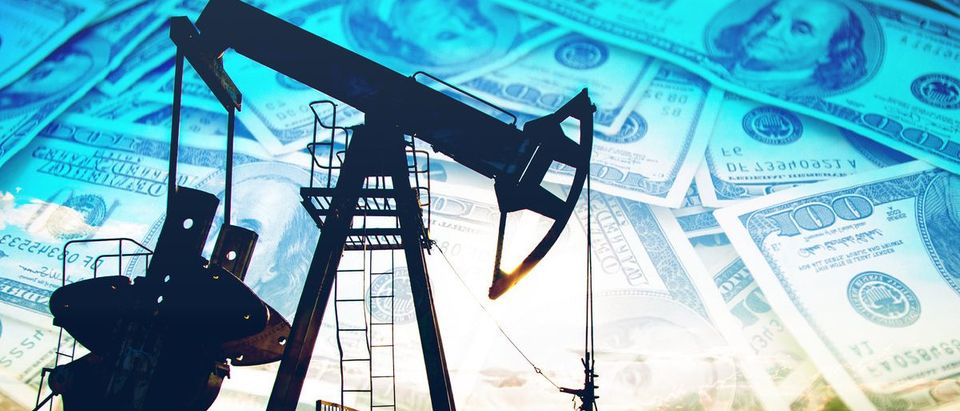Environmentalists are panicking that President-elect Donald Trump will trigger an energy jobs disaster by cutting green subsidies, but David Holt, president of the Consumer Energy Alliance, thinks exactly the opposite.
Green media is positively panicking that Trump’s cuts could literally end all life on Earth and cause a hypothetical jobs crisis by destroying the green energy industry. Conversely, Trump appears to be very supportive of industries that slash carbon dioxide (CO2) emissions while creating jobs.
“Trump has by and large been very consistently supportive of fracking and consistent regulation of it,” Holt said. “Trump will be a pro-energy President, and that’ll be great for all Americans. Fracking could save the average American up to $2,400 a year in energy savings. That’s great for everybody and it puts consumers in a great position.”
“Oil and natural gas are going to meet the vast majority of our energy needs for decades to come,” Hold stated. “Environmental groups are just out there just saying no. They’re not helping people rise out of poverty or cutting CO2 emissions. We are. Saying no without offering a solution should be ignored.”
Progressive outlet Mother Jones described Trump’s victory as “a Disaster for the Earth on Every Single Level” and well-known environmentalist Bill McKibben claimed he no longer felt proud to be an American because of it.
“It’s a disaster,” Rhone Resch, former CEO of the solar industry’s lobby, told Bloomberg.“We’ll need to educate Trump that solar energy is a business and not a political issue.”
Trump appears to be focusing on creating numerous new energy jobs through fracking, which could hold down energy bills while reducing carbon dioxide (CO2) emissions far more rapidly than solar and wind power.
If environmentalists succeeded in implementing proposed fracking bans, 3.9 million jobs would evaporate in 2017, rising to 14.8 million jobs lost by 2022, according to a study by the U.S. Chamber of Commerce. Gasoline prices would almost double as would electricity prices. U.S. household incomes would fall by $873 billion, costing the average American family $4,000 dollars annually. CO2 emissions would increase as well, according to the study.
Cheap oil and natural gas produced by fracking and brought to market by pipelines have lowered the annual cost of living for the average American by almost $750, according to a report published in May by the federal Energy Information Administration (EIA). Fracking-produced cheap natural gas caused energy prices to drop by 41 percent over the course of 2015, according another EIA report published in January, which is arguably helpful to the economically disadvantaged.
“This is wonderful for those that are at the poverty level or on fixed incomes and businesses that are struggling a little bit are the ones who get hurt the most by higher energy prices,” Holt said. “The net result of failing to allow energy development is that you are raising prices for the poor and those who are most vulnerable in the country.”
When the price of energy increases, the cost of goods and services increases, a reality which hits the poor hardest. Any product that is transported to market by truck or car uses gasoline and virtually every service uses electricity. Thus, low energy prices effectively reduce the price of almost everything, alleviating or providing relief to poverty-stricken households.
“We have a fresh start with the Trump administration,” Holt continued. “Simple things like permitting pipelines and approving the Keystone XL is almost immediately back on the table. That’s something that Trump could do instantly. This Presidential delay of the Dakota Access Pipeline is something I expect to be instantly resolved by the new Trump administration.”
This is especially great news for the poor, who tend to spend a higher proportion of their incomes on energy.
“It may not have a huge effect on the top 10 percent of households, but if you’re earning $30,000 or $40,000 a year and drive to work, this is a big deal,”Guy Berger, a Royal Bank of Scotland economist, told The New York Times. “Conceptually, this is the opposite of the stock market boom, which was concentrated at the top.”
“Inconsistent regulations were killing our energy and manufacturing sector,” Holt told TheDCNF “If you create consistent regulations, you’re going to onshore jobs, from China and back from all over the world. The geopolitics of energy have fundamentally changed in the last few years, and with a sensible policy from Washington our national and personal economic security will be greatly enhanced by American energy.”
Send tips to andrew@
All content created by the Daily Caller News Foundation, an independent and nonpartisan newswire service, is available without charge to any legitimate news publisher that can provide a large audience. All republished articles must include our logo, our reporter’s byline and their DCNF affiliation. For any questions about our guidelines or partnering with us, please contact licensing@dailycallernewsfoundation.org.


